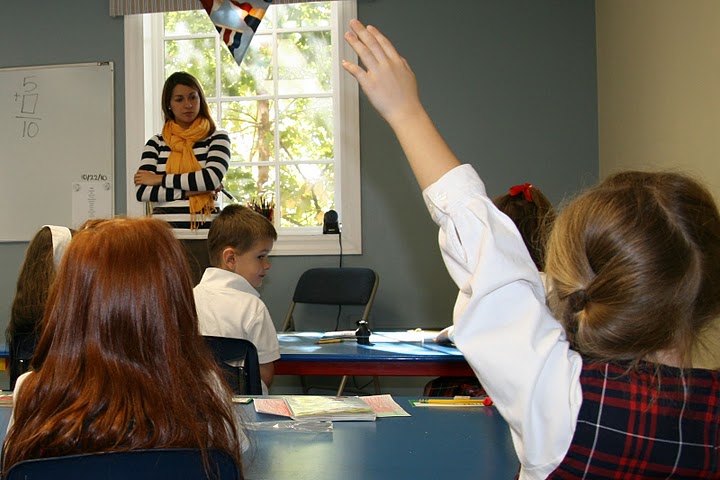By Renee Shear, Class One Teacher
Pinocchio is a prime example of what Charlotte Mason would call an ignorant and weak child. His puppet life was riddled with natural consequences of poor decisions and bad habits. Each day during read aloud, my class and I are left laughing, but frustrated, at the latest antics and misfortunes of Pinocchio.
While discussing this story, one child exclaimed, “How can Pinocchio be so bad?” Another replied, “He just doesn’t know! He needs someone to tell him!” In Pinocchio’s life, growth in character was stunted by a lack of training. The same can be true in the lives of “real” boys and girls. At Clapham, habit training is prioritized in classroom instruction. We seek to inform and strengthen children to choose the good and refuse the evil.
Miss Shear with students in her classroom
We inform ignorance and strengthen weakness for growth in heart issues and character. Just as Pinocchio was easily tempted, so are we in our fallen human nature. Often children simply lack knowledge to pursue the good, true, and beautiful and must be instructed in this way. To inform ignorance in the classroom could mean having discussions centered on the truths of the Bible such as how the Holy Spirit produces fruit in our lives or how godly men and women live. Guidelines of the classroom are also discussed daily and practiced so students are reminded how they ought to act. Private talks with students help address heart attitudes.
Though this informing demands time, the real energy comes in strengthening the child’s weaknesses with consistent, gentle reminders and natural consequences. Knowledge of the good may be present in the child, but support and accountability are needed to help a child do what is right. For instance, if a child is disruptive in class, simply stepping over to the student is all he may need to remind him to do what he ought. Doing this consistently, even in small ways, trains students to “choose the good and refuse the evil,” as Charlotte Mason says, and encourages growth in mind, heart, soul, and strength.
The reward of faithful instruction is for both the teacher and student. The student learns to delight in doing what they ought whether pushing in a chair or serving others. As these acts become second nature, the teacher sees the fruit of consistent effort.
Pinocchio’s path to become a real boy was arduous. Yet with faithful guidance, his growth in mind and heart was notable, and he learned to love the good. May we, as parents and teachers, be given the grace to attend to habits that nurture in students love for Christ and the desire to serve him.

